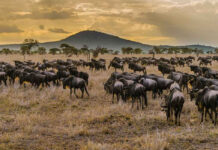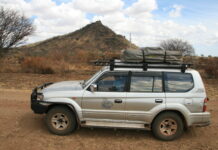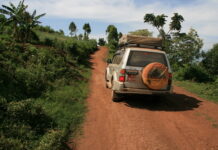Rwanda might be one of Africa’s smallest nations, but it is proudly home to an abundance of excellent wildlife diversity. Its modest size means that getting between places of interest is relatively quick and simple, which is just as well given the vast array of spectacular places to visit in Rwanda.
The capital city of Kigali is the country’s entry and exit point for gorilla trekking in Rwanda. You must book a Rwanda mountain gorilla trekking permit in advance so as to be sure of getting a chance of spotting mountain gorillas on a specific date.
Family gorilla safaris will take you to see mountain gorillas, wildlife as well as a rest at Lake Kivu. People travel from all parts of the world with the aim of spotting these amazing primates. Almost everyone, be it an adult, youth or child is fascinated by gorillas. Many take that fascination to the next level by deciding to see the gorillas in their natural setting –an activity called gorilla trekking.
Gorilla Trekking has rules and regulations guiding it and one of them is the age limit for trackers. For a person to take part in gorilla trekking, they must be 15 years and above. The age limit for gorilla trekking has been an obstacle for travelers who wish to register for the activity but with their children who are below the age of 15. It’s always a big blow to the parents when they inform them that their kids will not be allowed to join them for gorilla trekking. Some of the parents will plead to find a way of letting their children join them during trekking but will decline helping the parents because of the strict rules regarding gorilla trekking.
One of the reasons why people below 15 years are restricted from gorilla trekking is because they are considered immature and may be intimidated by the size of a gorilla. The massive size of a silver back and his serious appearance is intimidating to even some adults. Silver backs and even other members of the group may make a mock charge. A child may scream and run away attracting more attention from the primates.
Humans can spread diseases to them. Children tend to have a weaker immunity which is evidenced by the fact they frequently get flu and colds. They can easily transmit these diseases to the primates. Humans have evolved to deal with flu but it can affect gorillas badly leading to serious illness or death.
Children may be fit but not mentally prepared to deal with the challenges of walking long distances in search of gorillas. They may get tired, thirsty or hungry and request to go back to the lodge. This lack of patience may force their parents to cancel an otherwise amazing activity or cause disruption to other tourists.
Kids tend to be clumsy and reckless. They may find it difficult to adhere to the rules and regulations for gorilla trekking. Some of the gorilla trekking rules include avoiding unnecessary movements and noise. Other rules include not littering the park and keeping a 7 meter gap with the nearest primate.
Mountain Gorilla trekking permits can be sold out during the peak seasons, like from June to September and December to February. Only eight people can visit each gorilla group in a day. This implies that only 80 Gorilla permits are available for booking in a particular day. Locating some of these groups involves dealing with difficult and sometimes steep terrain. Gorilla groups in Rwanda move to a different location each day as they build new nests for the night.
The dry season offers numerous advantages, however this is the time when many people need previous reservation. Visitors have the opportunity, because the vegetation is less thriving, woodland vistas and fauna. During the dry season, however, gorillas prefer to travel for more than a few hours in order to seek more verdant foliage.
You must get up early in the morning, and therefore you need to choose a nearby lodge nearer the entrance to the park. Lastly you need to talk about Rwanda Accommodation like lodges at Volcanoes Park, hotels in Kigali, language spoken in Rwanda English and French; you’re informed at 7 am on safety precautions and the etiquette by your Gorilla guide in Rwanda Safari Holiday Tours.
Remember that mountain gorillas are termed thus a requirement for walking. It takes between 30 minutes and a few hours to do something. The forest guides are really competent in English and will bring you to the precise ‘usually used’ group of mountain gorillas which will surely be absolved of human presence.
Because of a great range of habitats in the National Volcano Park, this has broad bamboo forests and which serve as home for the Golden monkey. Golden Ape dwells at an altitude of about 3,600 m in the lower slopes of bamboo woods, differing from Gorillas tracking; golden monkeys remain for most of their time in bamboo forests so that tourists may not navigate around them looking for the forest. Golden monkeys are quick to move, fun to watch as they dance from tree to tree or sprint after each other.
Golden monkey safari in Rwanda starts at 7:00 a.m., visitors can observe two forces. They used to travel to the park with about 80 tourists, up to 8 visitors can track golden monks at a cost of USD 100 each capita just for one hour. Visitors may order their license in advance or obtain them at the headquarters of the park in Kinigi, where porters may be booked at USD 10, too.
Dian Fossey Tomb is a renowned grave garden where Dian Fossey was buried, an American natural scientist. Other gorillas of the Rwandan safari died on the same cemetery yard. Dian Fossey set up the study facility in the 1960s during her time of serious research on Gorilla conservation. The tomb is located at roughly 3000 m above sea level, in the saddle area, between two volcanoes at Mount Karisimbi and Visoke.
After all that set out for Lake Kivu. The lake and its surrounds have a unique feel to them; reminiscent of what you could describe as being an inland freshwater sea. Filled with volcanic islands, surrounded by beautiful beaches, terraced hills and fishing villages, all giving it a dramatic, picturesque and very charming setting. At night, you could almost romanticize being somewhere in the Caribbean with star-filled skies, temperate climate and sound of waves lapping at the sandy beaches.
A rewarding and tranquil cruise on the waters of the lake with longer cruises taking you to Amahoro and Munini Islands – the latter is also named Napoleon Island due to its resemblance to the conquering Frenchman’s infamous hat. The island is home to a large colony of fruit bats and after a short and relatively easy climb brings you face-to-face with them. There are also giant African millipedes, fish eagles and a wide variety of water birds. Occasionally you may even spot water snake. If you opt for an evening cruise, imagine yourself there, sipping a glass of wine as the sun sets on a serene day exploring the beautiful Lake Kivu.
Lake Kivu has many islands with one of the largest being Nyamirundi Island which is home to a large coffee plantation. Here you can learn all about the coffee making process; from harvesting, drying, roasting and of course culminating in the opportunity to sample some exceptionally fresh, organic and award-winning Rwandan coffee for yourself.
There’s a large number of uninhabited islands on the lake, some of which it’s possible to pre-book and overnight camping experience for those looking to experience the tranquillity of the lake under canvas.


